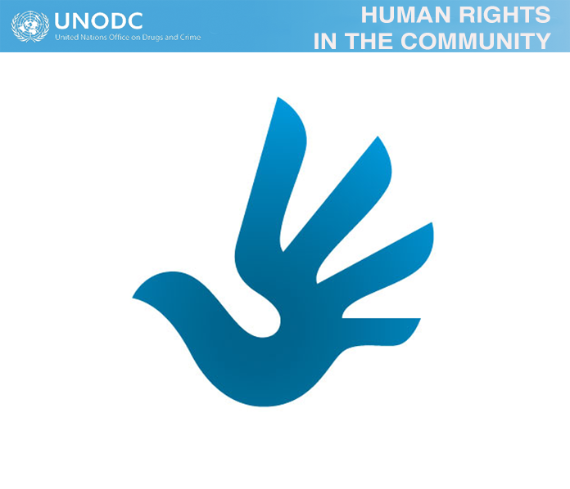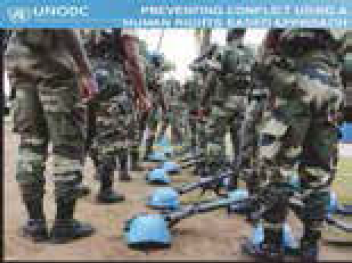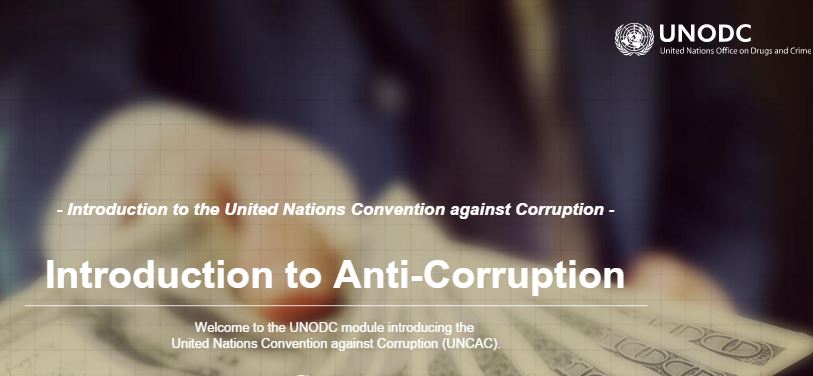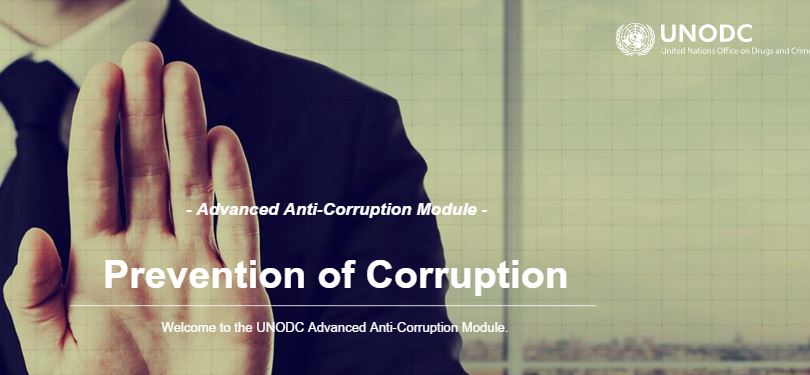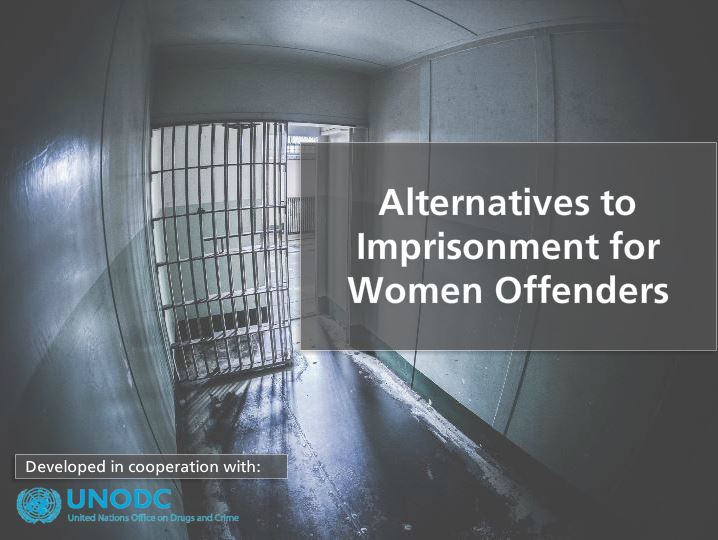Каталог
Доступ к полному каталогу курсов предоставляется учреждениям, структурам и прочим институтам по согласованию с УНП ООН. Физические лица не могут самостоятельно записаться на эти курсы. Если учреждение, которое вы представляете, заинтересовано в доступе к электронному обучению и полному каталогу, мы будем рады рассмотреть официальный запрос. Пожалуйста, обратитесь в ближайший офис УНП ООН в вашей стране.
Часть онлайн-курсов открыта для всех желающих и доступна здесь. Пройти их можно после самостоятельной регистрации на странице системы электронного обучения УНП ООН.
Обзор Курсов
2. Airport Interdiction Techniques and Risk Assessment
3. Seaport Interdiction Techniques and Risk Assessment
4. Container Profiling and Examination
5. Interview and Search of Persons
6. Controlled Deliveries
7. Investigating Drug Organised Crime
8. Clandestine Laboratories and Precursor Control
9. Money Laundering and Financial Crimes
10. Crime Scene Investigation
11. Introduction and Application of Intelligence
12. Intelligence Analysis
13. Human Trafficking
14. Smuggling of Migrants
15. Human Rights
16. Security Document Examination
17. Wildlife and Forest Crime
18. Risk Management
19. Cybercrime
20. HIV/AIDS
21. Anti-Corruption
22. Drug Identification and Testing
23. Gender Issues
24. Investigating Sexual Exploitation of Children
26. International Narcotics Control Board
27. Safe Handling and Disposal of Chemicals in Remote, Developing and Non-Secure Environments
28. Strengthening National Evaluation Capacity
29. Firearms Trafficking
30. HIV Service Provision for People Who Inject Drugs
31. Organized Crime
32. Judicial Ethics
33. Counter-Terrorism
1. Land Border Interdiction
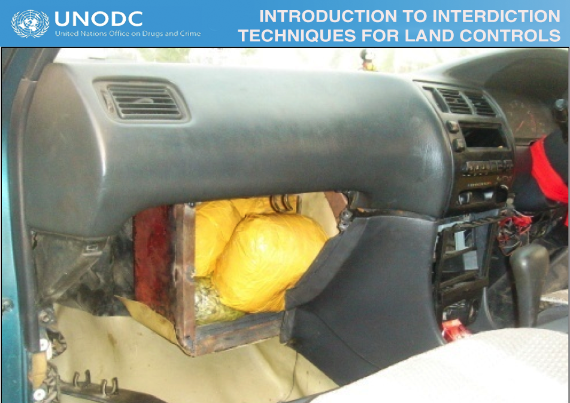
1.1 Introduction to Interdiction Techniques for Land Controls
This self-paced module provides an introduction to interdiction techniques that can be used at land controls to identify and intercept drug smugglers. It describes various interdiction techniques and why there is a need to use these techniques.
Available in:
English, Bahasa, French, Khmer, Sinhala, Thai, Urdu
Duration: 60 - 100 min.
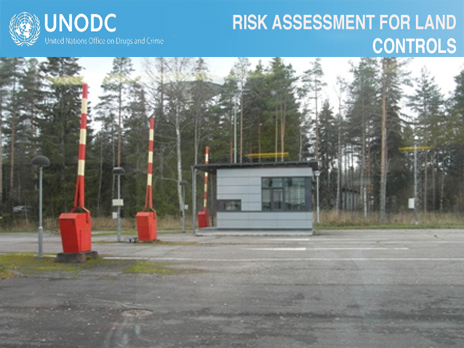
1.2 Risk Assessment for Land Controls
This self-paced module outlines the process of performing a risk assessment at border crossings and inland checkpoints. You will learn how to consider areas in the controls where there is a weakness or vulnerability to drug smuggling and to consider solutions to minimise or solve problems.
Available in:
English, Bahasa, Khmer, Sinhala, Thai, Urdu
Duration: 90 - 120 min.
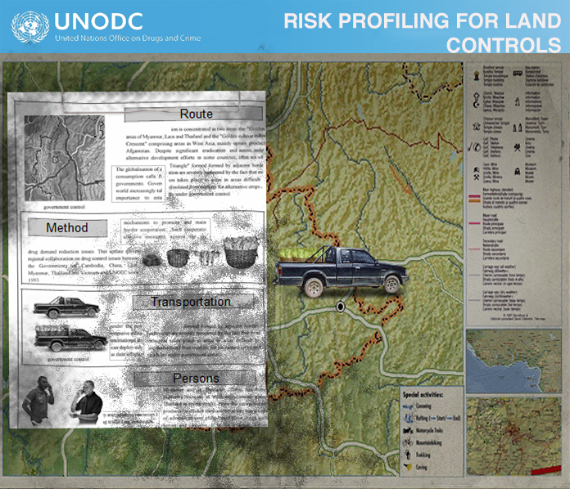
1.3 Risk Profiling for Land Controls
This self-paced module provides an overview of risk profiling, what it is and how to create a risk profile for use at land controls. A risk profile looks at common drug smuggling characteristics and how by identifying these characteristics, you can form an idea of what drug traffickers might look like or what methods they might use.
Available in:
English, Khmer, Thai
Duration: 60 - 90 min.
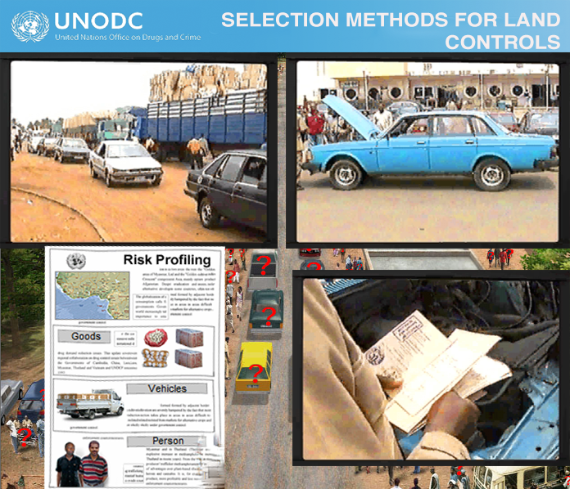
1.4 Selection Methods for Land Controls
This self-paced module provides an introduction to the selection process for land controls. It describes how, by using preliminary observation, behavioural indicators and other methods, an officer can select persons that are most likely to be involved in drug smuggling.
Available in:
English, Bahasa, Khmer, Thai
Duration: 30 - 45 min.
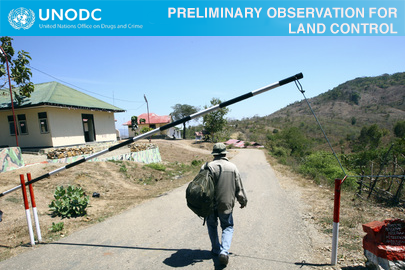
1.5 Preliminary Observation for Land Controls
This self-paced module provides an overview of preliminary observation for land controls. The goal of preliminary observation is to quickly observe a person or vehicle in order to identify those persons that are most likely to be involved in drug smuggling.
Available in:
English, Bahasa, Khmer, Sinhala, Thai, Urdu
Duration: 45 - 60 min.
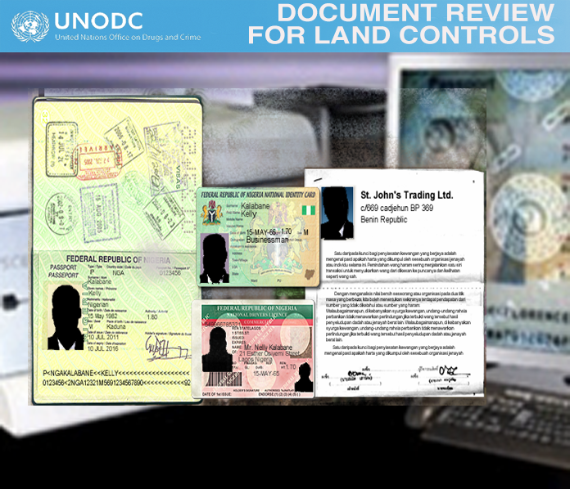
1.6 Document Review for Land Controls
This self-paced module covers the review of documents that are used at typical land controls, including identification cards, passports and vehicle identification documents. The module explains the various risk indicators that can be used when reviewing documents.
Available in: English, Bahasa, Khmer, Thai
Duration: 30 - 45 min.
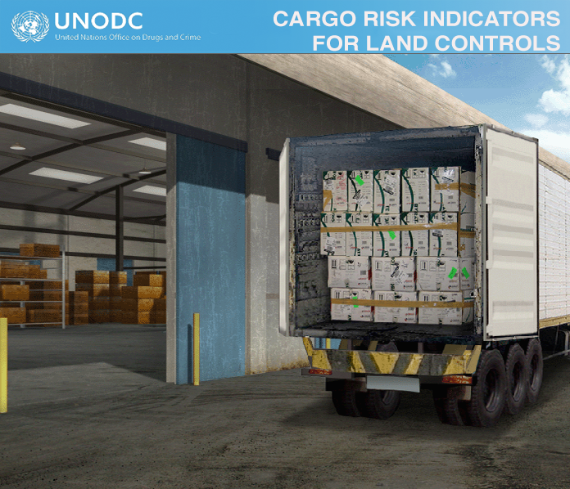
1.7 Cargo Risk Indicators for Land Controls
This self-paced module provides training on how to review cargo and its documentation in order to determine which shipments are most likely to be used in drug smuggling. You will be taught how to evaluate if a shipment makes economic sense and other information that will help officers select those shipments that are most likely to be used for drug trafficking.
Available in: English, Bahasa, Khmer, Thai
Duration: 60 - 90 min.
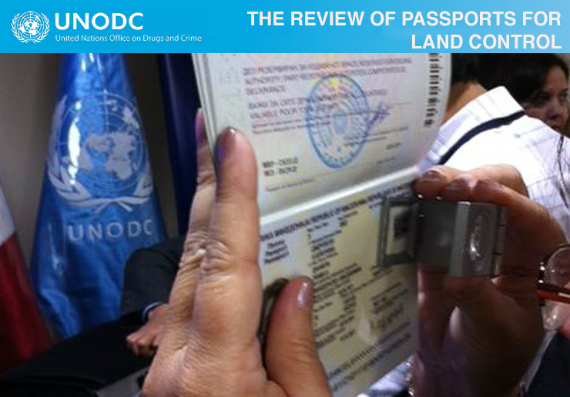
1.8 The Review of Passports for Land Controls
This self-paced module considers how passports can be examined to reveal likely drug traffickers.
Available in: English, Bahasa, Khmer, Thai
Duration: 70 - 100 min.

1.9 Performing a Car Search
This self-paced module covers the It covers the different areas of a car and basic concepts and techniques for systematically searching a car. The most important goal when searching a car is not to look for drugs but to look for spaces where drugs might be concealed.
Available in: English, Bahasa, French, Khmer, Sinhala, Thai, Urdu
Duration: 90 - 120 min.
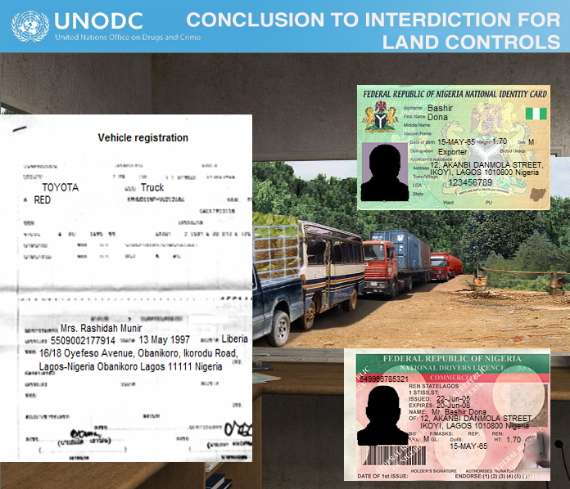
1.10 Conclusion to Interdiction for Land Controls
This self-paced module concludes the land border interdiction course. In this module, you will have the opportunity to review the course material. You will learn how all this information can be used to identify which persons, cargo or vehicles should be given the most attention in order to identify drug smugglers.
Available in: English, Khmer, Thai
Duration: 90 - 120 min.
2. Airport Interdiction Techniques and Risk Assessment
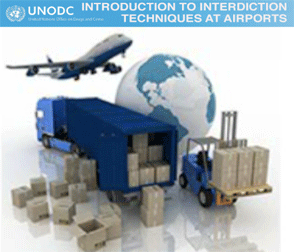
2.1 Introduction to Interdiction Techniques at Airports
This self-paced module introduces the different interdiction techniques that can be used at airports to identify and intercept drug smugglers. It describes various interdiction techniques and why there is a need to use them.
Available in: English, Bahasa, Khmer, Thai
Duration: 60 - 90 min.
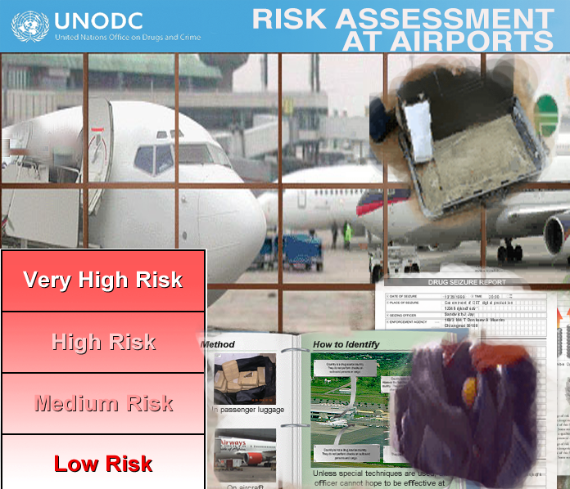
2.2 Risk Assessment at Airports
This self-paced module describes the process of performing a risk assessment at airports. The module raises the level of awareness and encourages you to consider areas in the controls where there is a weakness or vulnerability to drug smuggling. The module also encourages you to consider solutions to minimise or solve problems.
Available in: English, Khmer, Thai
Duration: 75 - 120 min.
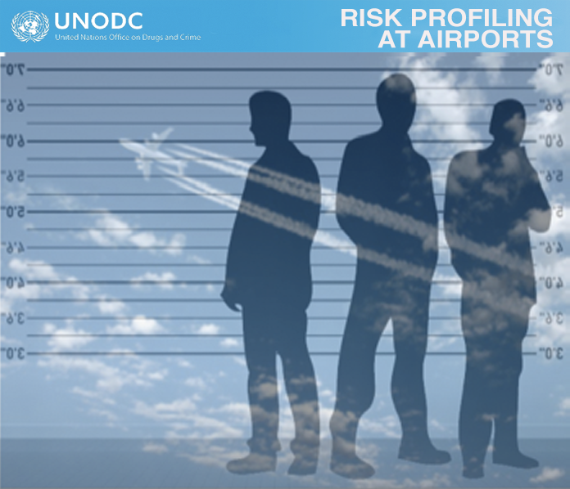
2.3 Risk Profiling at Airports
This self-paced module covers risk profiling, what it is and how to create a risk profile for use at airports. A risk profile looks at common drug smuggling characteristics and how by identifying these characteristics, you can gain an impression of what drug traffickers might look like or what methods they might use.
Available in: English, Bahasa, Khmer, Thai
Duration: 45 - 90 min.
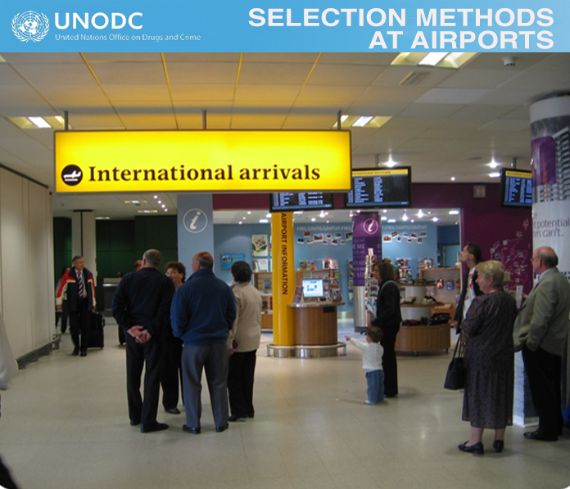
2.4 Selection Methods at Airports
This self-paced module covers the selection process at airports. It describes how by using preliminary observation, questioning, behavioural indicators and other methods, you can select persons that are most likely to be involved in drug smuggling so that they can be given more attention.
Available in: English, Bahasa, Khmer, Thai
Duration: 30 - 45 min.
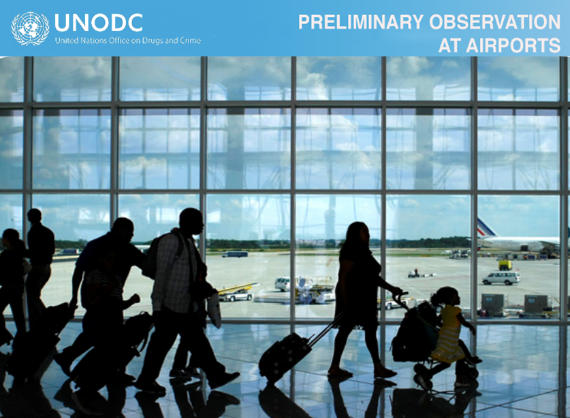
2.5 Preliminary Observation at Airports
This self-paced module covers the basic principles of preliminary observation, so that you can more effectively identify high-risk persons coming through an airport.
Available in: English, Khmer, Thai
Duration: 30 - 60 min.
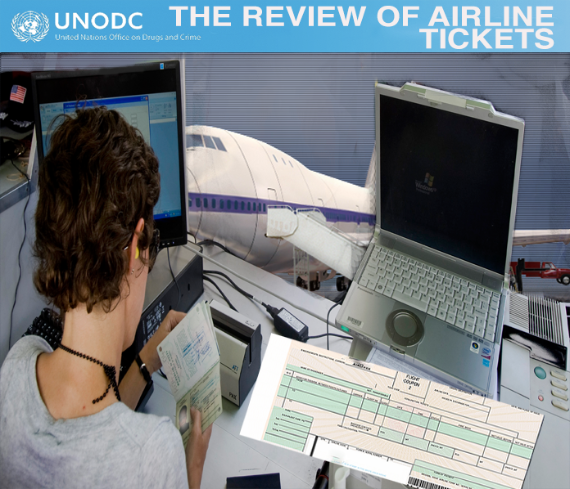
2.6 Review of Airline Tickets
This self-paced module explains the purpose of each field on a typical airline ticket, how to interpret the information contained therein and how to consider various risk indicators.
Available in: English, Bahasa, Khmer, Thai
Duration: 80 - 115 min.
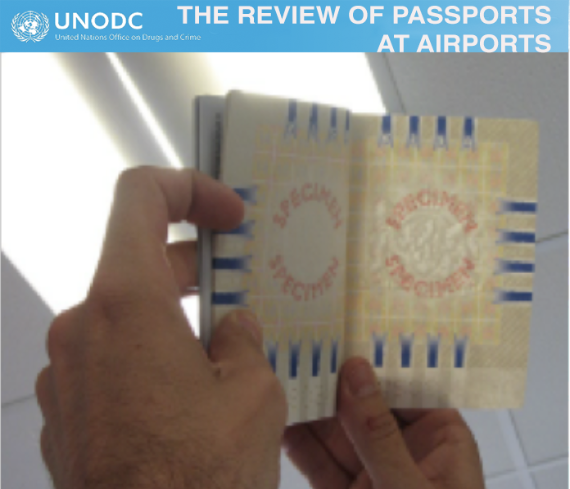
2.7 Review of Passports at Airports
This self-paced module covers how passports can be examined to reveal likely drug traffickers.
Available in: English, Bahasa, Khmer, Thai
Duration: 70 - 100 min.
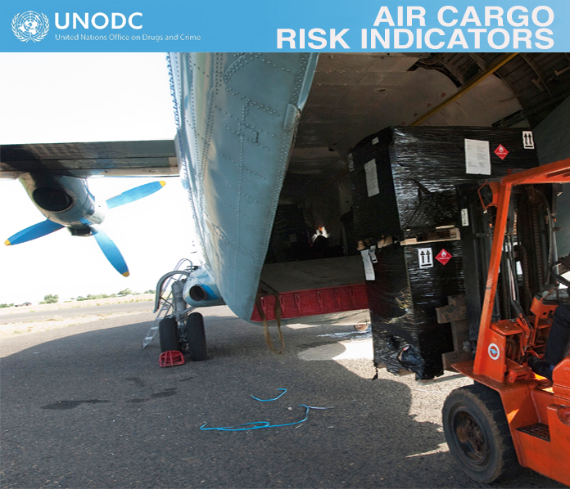
2.8 Air Cargo Risk Indicators
This self-paced module covers the inspection of air cargo in order to identify shipments of cargo that may be carrying illegal drugs.
Available in: English, Bahasa, Khmer, Thai
Duration: 60 - 90 min.
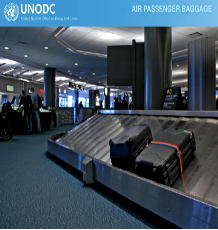
2.9 Air Passenger Baggage
This self-paced module covers the preliminary observation and inspection of passenger baggage. The main objective of this module is to teach you how to first identify and then search baggage that may potentially contain drugs.
Available in: English, Bahasa, Khmer, Thai
Duration: 60 - 90 min.
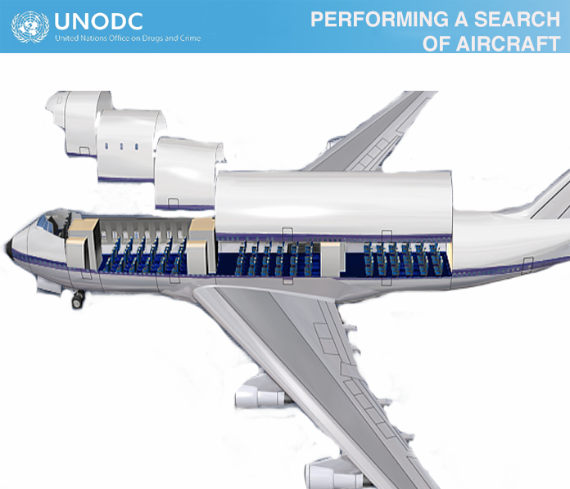
2.10 Performing a Search of Aircraft
This self-paced module covers basic concepts and techniques of systematic searching of an aircraft.
Available in: English, Bahasa, Khmer, Thai
Duration: 60 - 90 min.
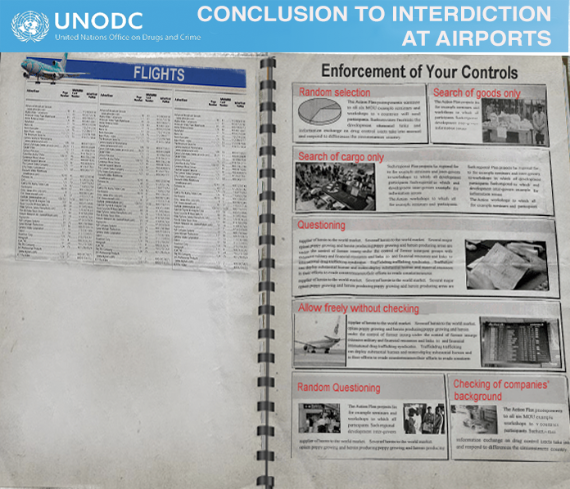
2.11 Conclusion to Interdiction at Airports
This self-paced module reviews all the information you have learned and allows to see how these techniques work together to bring you an efficient, systematic way to stop drug trafficking. This should be the last module attempted in the series of modules on airport interdiction techniques.
Available in: English, Bahasa, Khmer, Thai
Duration: 90 - 120 min.
3. Seaport Interdiction Techniques and Risk Assessment
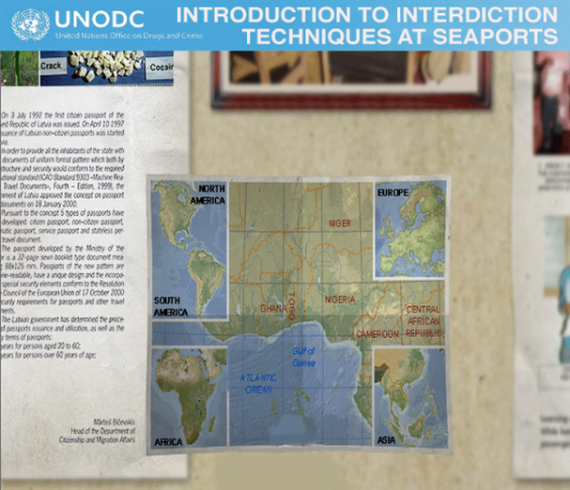
3.1 Introduction to Interdiction techniques at Seaports
This self-paced module introduces the different interdiction techniques that can be used at seaports to identify and intercept drug smugglers. It describes various interdiction techniques and why there is a need to use them.
Available in: English, Bahasa, Khmer, Thai
Duration: 60 - 120 min.
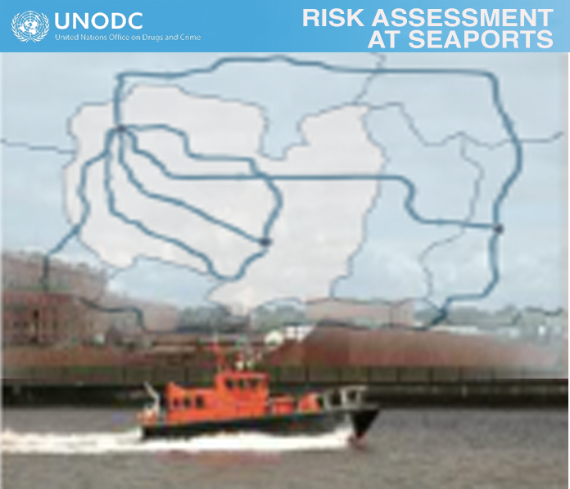
3.2 Risk Assessment at Seaports
This self-paced module describes the process of performing a risk assessment at seaports. The module raises the level of awareness and considers areas in the controls where there is a weakness or vulnerability to drug smuggling. The module encourages you to consider solutions to minimise or solve problems.
Available in: English, Bahasa, Khmer, Thai
Duration: 75 - 100 min.
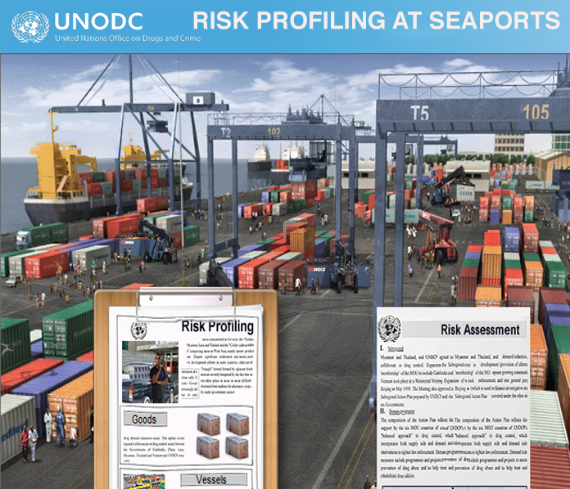
3.3 Risk Profiling at Seaports
This self-paced module covers risk profiling, what it is and how to create a risk profile for use at seaports. A risk profile looks at common drug smuggling characteristics and how, by identifying these characteristics, you can get an idea of what drug traffickers might look like or what methods they might use.
Available in: English, Bahasa, Khmer, Thai
Duration: 45 - 90 min.
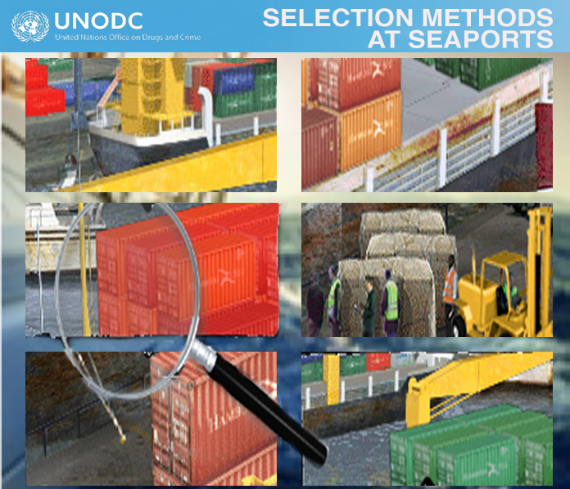
3.4 Selection Methods at Seaports
This self-paced module is an introduction to the selection process. It describes how, by using a preliminary assessment of cargo, cargo document review and other methods, you can select persons or cargo that are most likely to be involved in drug smuggling so that they can be given more attention.
Available in: English, Bahasa, Khmer, Thai
Duration: 30 - 45 min.
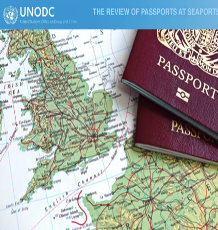
3.5 The Review of Passports at Seaports
This self-paced module covers how passports can be examined to reveal likely drug traffickers.
Available in: English
Duration: 70 - 100 min.
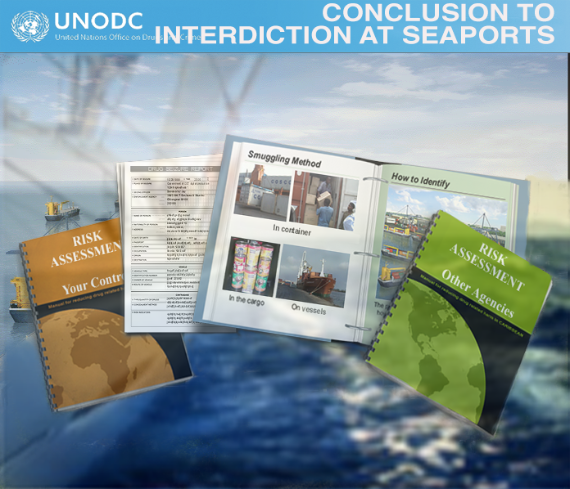
3.6 Conclusion to Interdiction at Seaports
This self-paced module reviews all the information you have learned and allows to see how these techniques work together to bring you an efficient, systematic way to stop drug trafficking. This should be the last module attempted in the series of modules on seaport interdiction techniques.
Available in: English, Bahasa, Khmer, Thai
Duration: 60 -120 min.
4. Container Profiling and Examination
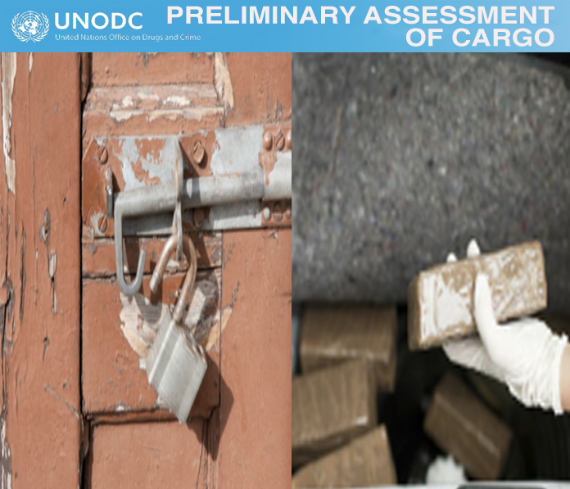
4.1 Preliminary Assessment of Cargo
This self-paced module covers the preliminary assessment of cargo in order to identify shipments that may be carrying illegal drugs.
Available in: English, Bahasa, Khmer, Thai
Duration: 45 - 60 min.
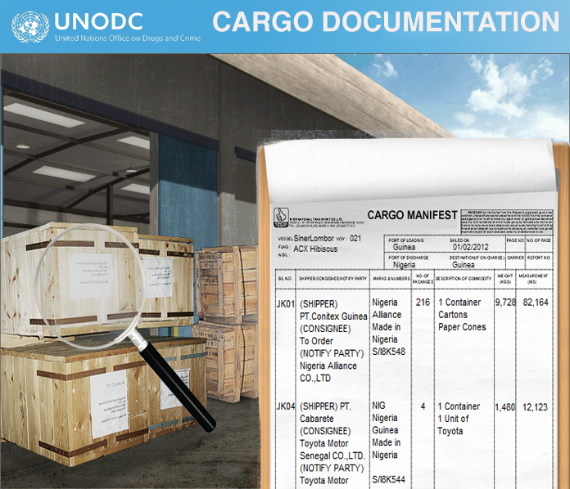
4.2 Cargo Documentation
This self-paced module covers the review of cargo documentation and how you can use cargo document review as a means to quickly identify which shipments should be given further.
Available in: English, Bahasa, Khmer, Thai
Duration: 45 - 60 min.
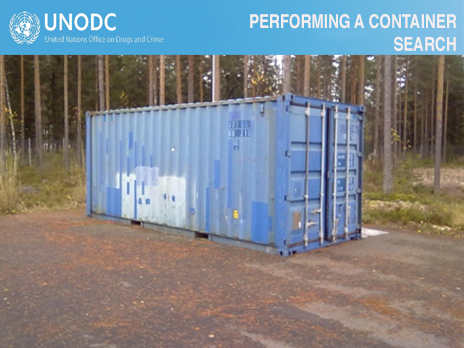
4.3 Performing a Container Search
This self-paced module covers the basic concepts and techniques of how to systematically search a container. It outlines different areas of a container, where spaces are or can be created and how to search these areas in a systematic way.
Available in: English, Bahasa, Khmer, Thai
Duration: 90 - 120 min.
5. Interview and Search of Persons

5.1 Behavioural Indicators
This self-paced module covers behavioural indicators and what to look for in order to identify persons who are acting suspiciously and likely to be involved in drug smuggling. This module is linked closely to the module on initial questioning techniques.
Available in: English, Bahasa, Khmer, Thai
Duration: 60 - 100 min.
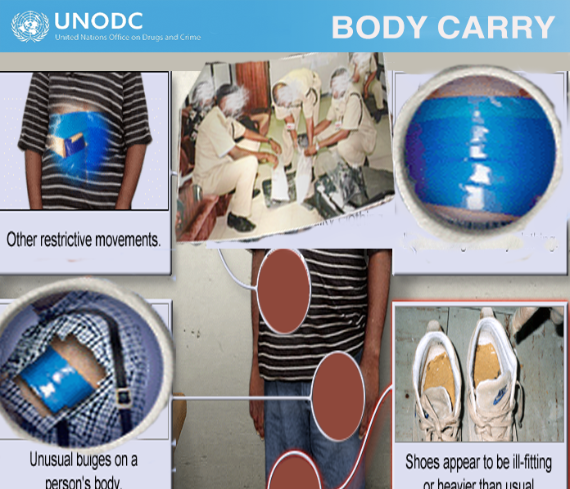
5.2 Body Carry
This self-placed module covers the smuggling of illegal drugs through body carry. By the end of this course, you will have a clear understanding of what body carry is, why it presents a problem to drug law enforcement and how to recognise body-carry drug smugglers.
Available in: English, Bahasa, Khmer, Thai
Duration: 60 - 90 min.
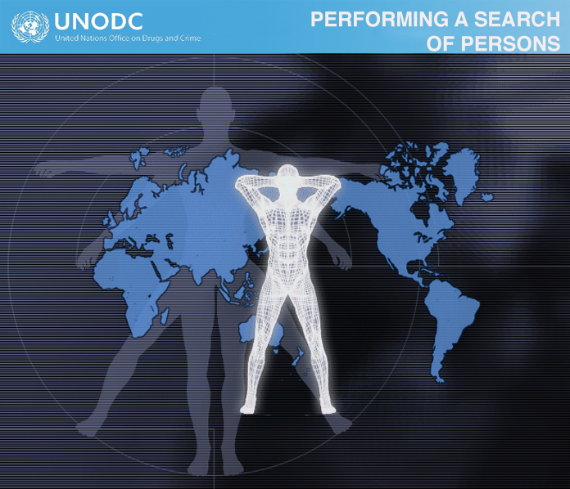
5.3 Performing a Search of Persons
This self-paced module will teach you how to search a person. It covers some of the most common types of searches as well as safety precautions and other considerations before a search is carried out.
Available in: English, Bahasa, Khmer, Thai
Duration: 90 - 120 min.
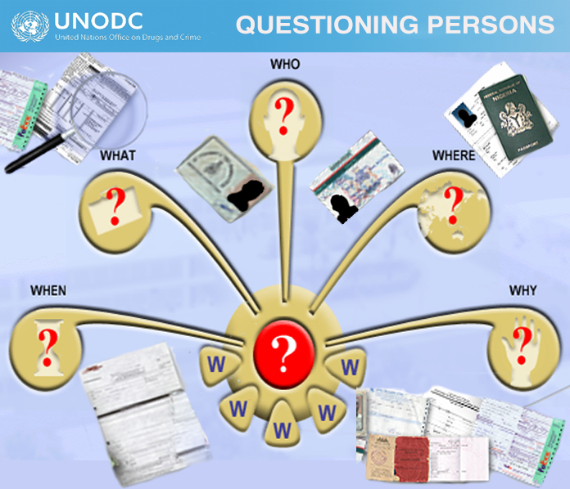
5.4 Questioning Persons
This self-paced module covers the basics of how to question a person, the types of questions to ask and how to listen effectively to a person's answers. Questioning is a simple and often quick method of identifying drug smugglers.
Available in: English, Bahasa, French, Khmer, Sinhala, Thai, Urdu
Duration: 60 - 100 min.
6. Controlled Deliveries
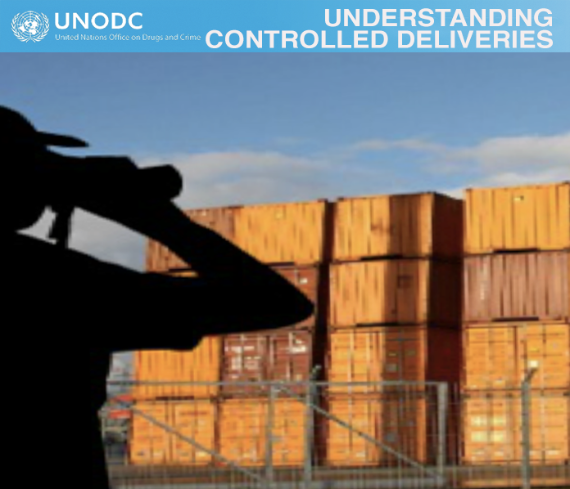
6.1 Understanding Controlled Deliveries
This self-paced module covers what controlled deliveries are and how you can use controlled deliveries to maximise your law enforcement efforts. This module explains the risks and benefits of using controlled deliveries and under what circumstance controlled deliveries should be used.
Available in: English, French, Khmer, Sinhala, Thai
Duration: 60 - 120 min.
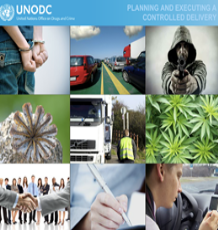
6.2 Planning and Executing a Controlled Delivery
This self-paced module reviews the principles taught in the module entitled "Understanding Controlled Deliveries" and teaches you how to apply controlled deliveries to the many different circumstances under which a controlled delivery can be initiated. You will learn the basic steps that must be taken when planning a controlled delivery, the different types of controlled deliveries and their specific circumstances. Finally, you will learn how to execute each of these types of controlled deliveries.
Available in: English, Sinhala, Khmer, Thai
Duration: 90 -150 min.
7. Investigating Drug Organised Crime
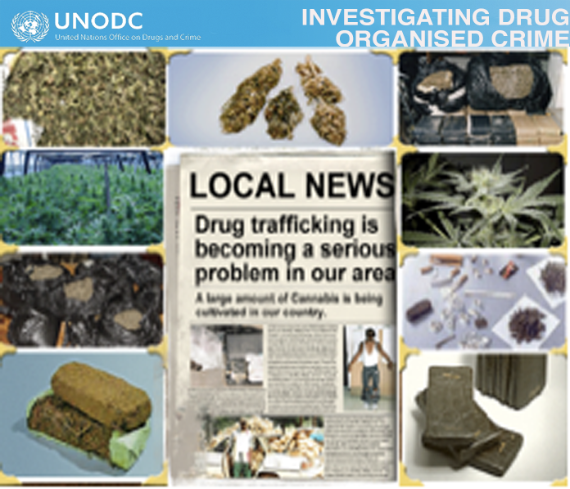
7.1 Investigating Drug Organised Crime
This self-paced module covers what organised crime is and the importance of identifying and furthering investigations in order to identify persons involved in planning, financing and managing criminal operations.
Available in: English, Sinhala, French
Duration: 90 - 120 min.
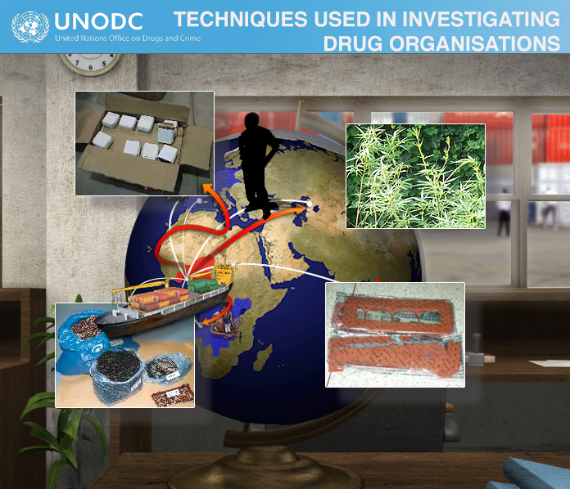
7.2 Techniques Used in Investigating Drug Organisations
This self-paced module covers the different techniques that can be used in order to further an investigation and identify and arrest persons in charge of criminal organisations.
Available in: English, Sinhala, French
Duration: 120 - 180 min.

7.3 Evidence and Drug Organised Crime
This self-paced module covers the importance of using evidence to further an investigation and how to properly handle evidence so that it can be used in a court of law.
Available in: English, Sinhala, French
Duration: 90 - 120 min.
8. Clandestine Laboratories and Precursor Control
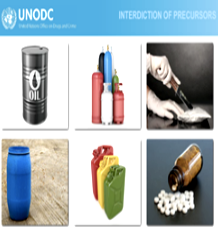
8.1 Interdiction of Precursors
This self-paced module covers how to recognise what precursors are and how they are used legally and illegally. It explains how to identify challenges facing the enforcement of precursor manufacture and shipping, how to recognise the importance of handling chemicals safely and how to detect the illegal shipment of precursors and equipment.
Available in: English, Sinhala, Thai
Duration: 60 min.
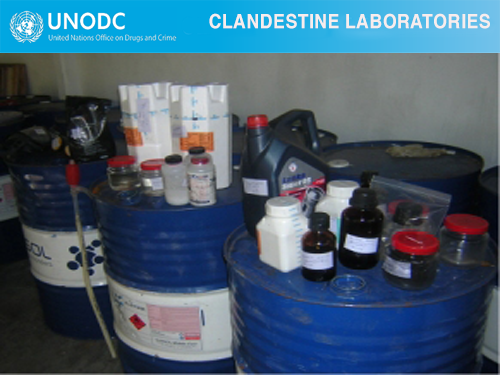
8.2 Clandestine Laboratories
This self-paced module covers how to recognise the key elements needed for a clandestine laboratory to operate and how to identify common signs of illegal activity associated with clandestine laboratories. It also explains how to identify typical locations for clandestine laboratories and how to investigate the activities of clandestine laboratories.
Available in: English, Sinhala, Khmer, Thai
Duration: 60 min.
9. Money Laundering and Financial Crimes
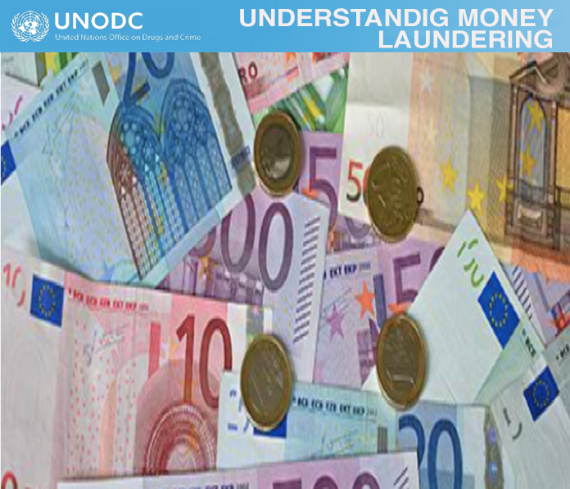
9.1 Understanding Money Laundernig
This self-paced module introduces the topic of money laundering. This module covers some common money laundering methods and actions that can be taken to fight money laundering. You will learn what money laundering is and why criminals need to launder money.
Available in: English, Bahasa, Thai
Duration: 60 - 90 min.

9.2 Laundering Methods
This self-paced module covers the methods that criminals use to launder money and what methods are used in the three stages of money laundering. You will learn about common money laundering methods.
Available in: English, Bahasa, Thai
Duration: 75 - 120 min.
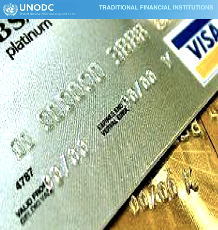
9.3 Traditional Financial Institutions
This self-paced module covers financial transactions and what steps can be taken to combat money laundering, different types of financial records and the information that they contain. You will learn what steps financial institutions can take in order to prevent money laundering and how to recognise signs of suspicious transactions.
Available in: English, Bahasa, Thai
Duration: 45 - 90 min.

9.4 Non-Traditional Financial Institutions
This self-paced module covers informal financial institutions. You will learn what informal financial institutions are, how they are used by money launderers to launder their money, what the alternative remittance system is and how it works.
Available in: English, Bahasa, Thai
Duration: 30 - 45 min.
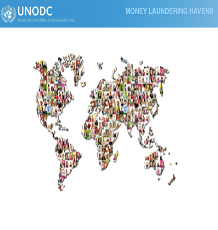
9.5 Money Laundering Havens
This self-paced module covers financial havens and how they are used by money launderers. You will learn the different services that they offer, how these services are used by money launderers to layer and integrate their illegal proceeds.
Available in: English, Bahasa, Thai
Duration: 30 - 60 min.
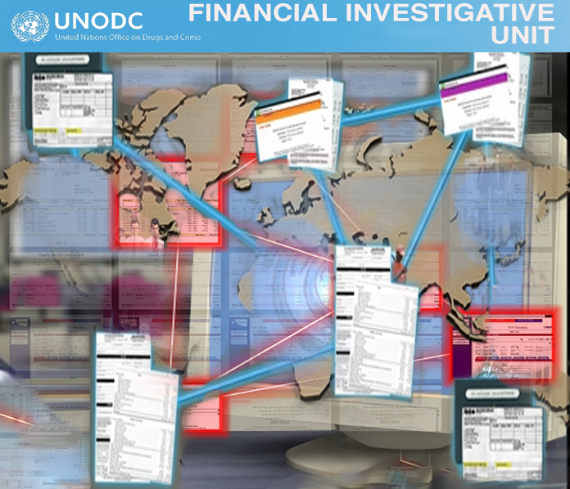
9.6 Financial Intelligence Unit
This self-paced module covers financial intelligence units. You will learn why there is a need for a financial intelligence unit, the roles and responsibility of a financial intelligence unit, and what factors are important for the success of a financial intelligence unit.
Available in: English, Bahasa, Thai
Duration: 80 - 115 min.
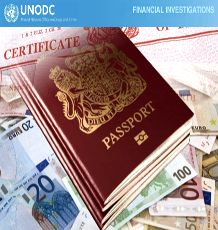
9.7 Financial Investigations
This self-paced module covers how financial investigations are conducted. You will learn the different phases of a financial investigation, the process and the information that is needed in order to initiate an investigation and why planning is so important.
Available in: English, Bahasa, Thai
Duration: 70 - 100 min.
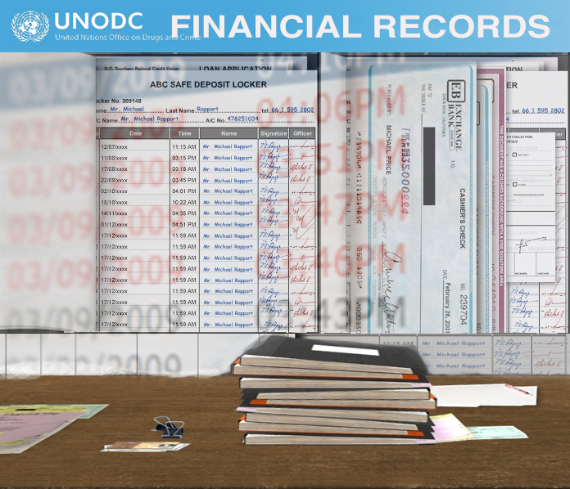
9.8 Financial Records
This self-paced module covers where and how to obtain financial records for use in a money laundering investigation. You will learn with the different institutions that keep records relevant to a financial investigation and the type of records that can be obtained at each institution.
Available in: English, Bahasa, Thai
Duration: 60 - 100 min.
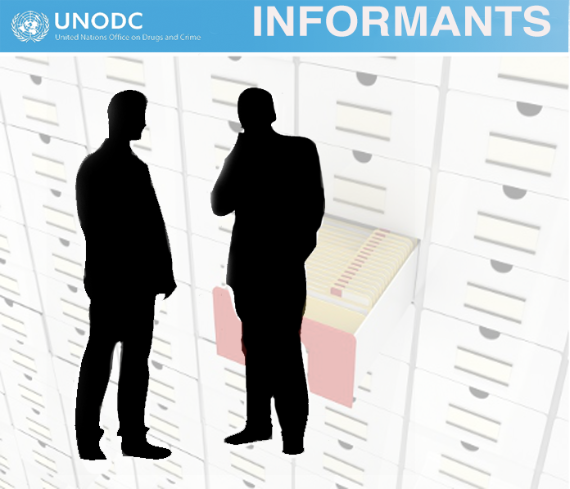
9.9 Informants
This self-paced module covers how to locate, manage and develop informants for use in a money laundering investigation. You will learn what informants are and their importance in an investigation, where to locate informants for use in a money laundering investigation and the factors that must be considered when developing and handling informants.
Available in: English, Bahasa, Thai
Duration: 60 - 100 min.
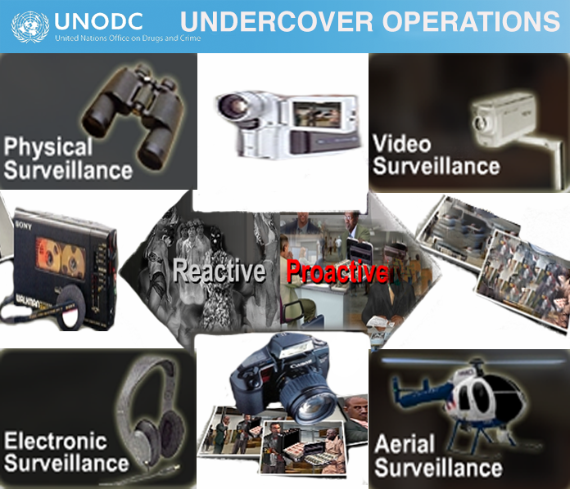
9.10 Undercover Operations
This self-paced module covers surveillance and undercover operations and their usefulness in money laundering investigations. You will learn what surveillance is and how it can be used in financial investigations, what undercover operations are and their usefulness in financial investigations.
Available in: English, Bahasa, Thai
Duration: 60 - 90 min.

9.11 Net Worth Analysis
This self-paced module covers how to perform a net worth analysis in order to determine what assets were acquired through unknown or illegal sources. You will learn what a net worth analysis is, its purpose, how it is calculated and what factors must be considered when calculating a net worth.
Available in: English, Bahasa, Thai
Duration: 60 - 90 min.
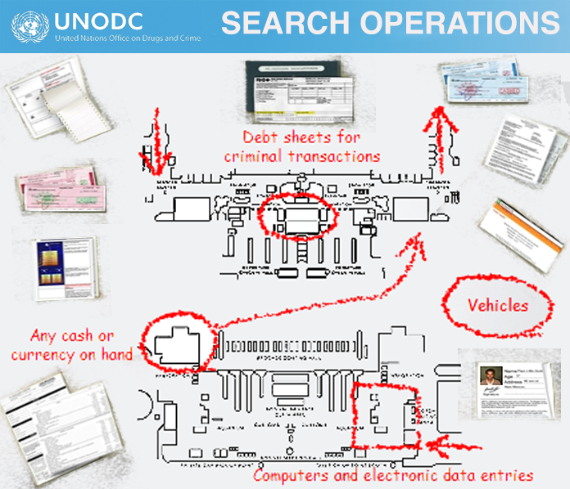
9.12 Search Operations
This self-paced module covers factors that should be considered when performing a search to obtain evidence in a money laundering investigation. You will learn what factors must be considered when performing a search for financial records, why assets should also be seized at the same time when searching for financial records and the seizing and processing of computer-based evidence.
Available in: English, Bahasa, Thai
Duration: 60 - 90 min.
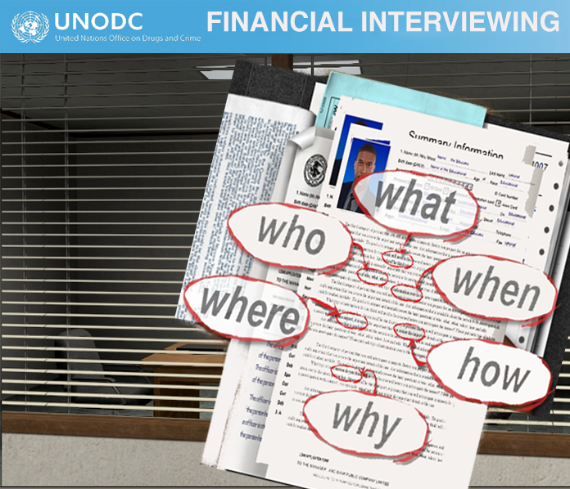
9.13 Financial Interviewing
This self-paced module covers how to interview and interrogate persons. You will learn how to prepare for interviews and interrogations what factors must be considered when interviewing or interrogating persons, including what type of questions to ask and under what circumstances they should be used. You will learn a number of approaches that can be used to more effectively obtain information.
Available in: English, Bahasa, Thai
Duration: 90 - 120 min.
10. Crime Scene Investigation

10.1 Crime Scene Awareness
This self-paced module covers the crime scene, the different types of evidence and the importance of using a systematic process for the recognition, protection, recovery, analysis and use of evidence in court.
Available in: English, Sinhala, French
Duration: 60 - 120 min.
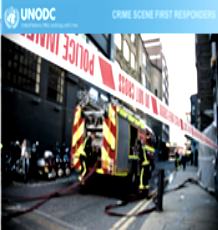
10.2 Crime Scene First Responders
This self-paced module covers what first responders to a crime scene should do when arriving at a crime scene.
Available in: English, Sinhala, French
Duration: 45 - 90 min.
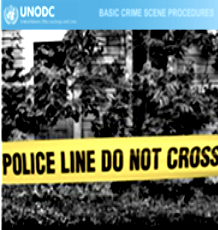
10.3 Basic Crime Scene Procedures
This self-paced module covers what you should do if crime scene investigators are not available.
Available in: English, Sinhala
Duration: 60 - 120 min.
11. Introduction and Application of Intelligence
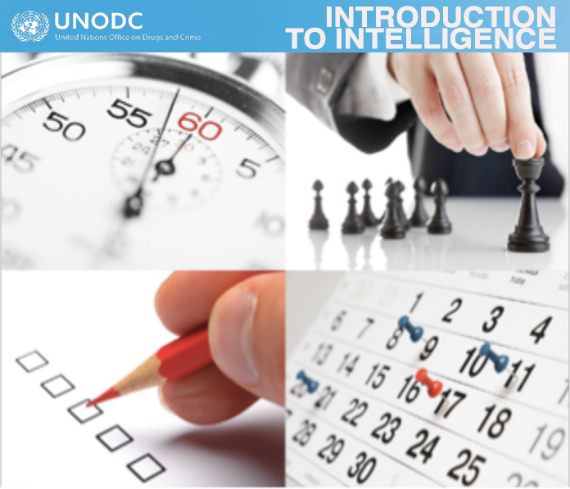
11.1 Introduction to Intelligence
This self-paced module introduces intelligence and how it relates to law enforcement.
Available in: English, Khmer, Sinhala, Thai
Duration: 60 min.
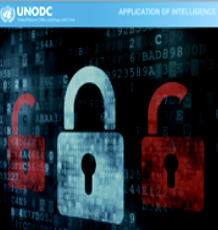
11.2 Application of Intelligence
This self-paced module covers the application of intelligence and its important role in law enforcement.
Available in: English, Khmer, Sinhala, Thai
Duration: 60 min.
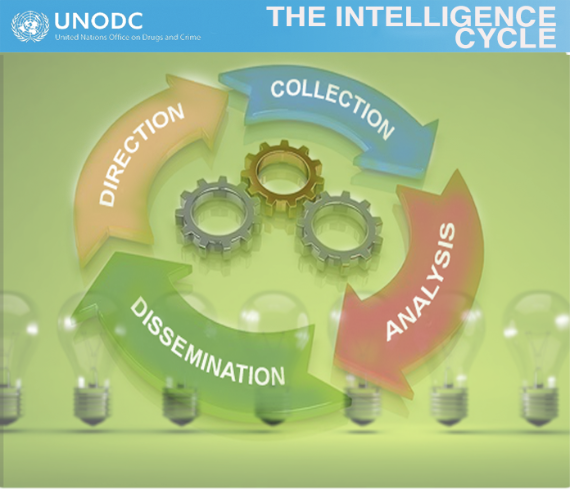
11.3 The Intelligence Cycle
This self-paced module covers the different phases and steps that are part of the intelligence cycle. You will have an overall understanding of how the intelligence cycle works in law enforcement. It is the final module in the introduction to intelligence series.
Available in: English, Khmer, Sinhala, Thai
Duration: 60 min.
12. Intelligence Analysis
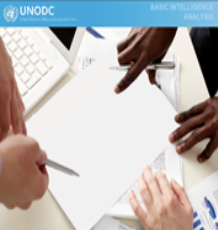
12.1 Basic Intelligence Analysis
This module covers basic intelligence analysis and why it is a critical part of intelligence.
Available in: English, Khmer, Sinhala, Thai
Duration: 60 min.
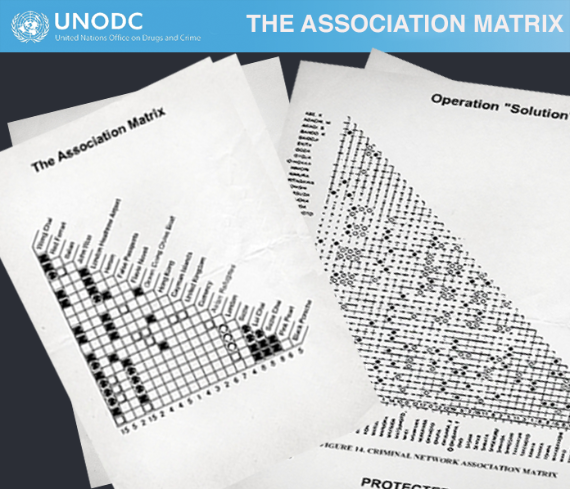
12.2 The Association Matrix
This module covers the creation of an association matrix and how it can be used to identify links between entities.
Available in: English, Bahasa, Khmer, Thai
Duration: 90 - 120 min.
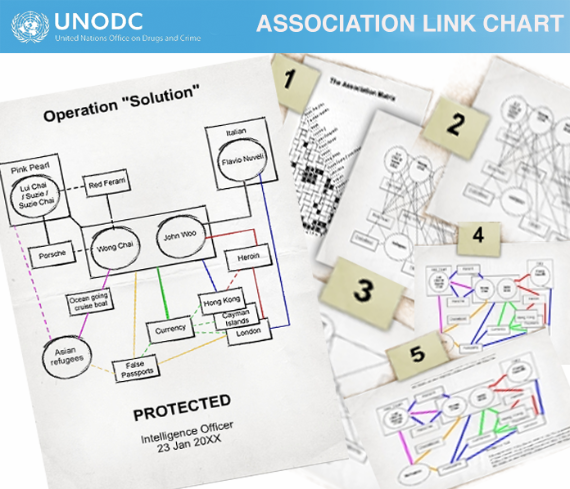
12.3 Association Link Chart
This self-paced module the creation of an association link chart and explains how an association link chart can help you identify links between persons, places and commodities.
Available in: English, Khmer, Thai
Duration: 90 - 120 min.
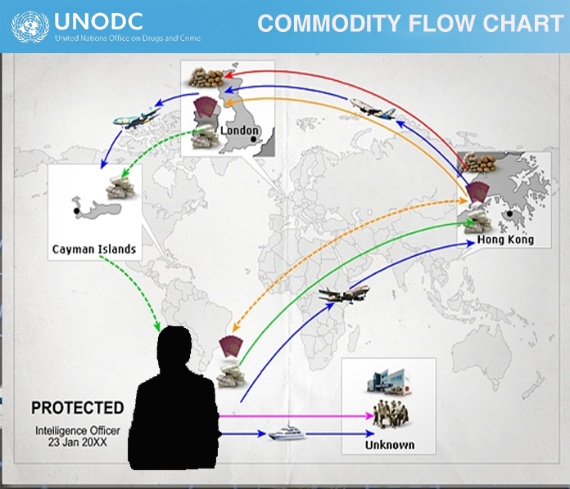
12.4 Commodity Flow Chart
This self-paced module covers the creation of a commodities flow chart and how it can be used to identify the flow of commodities in the crime that you are investigating.
Available in: English, Bahasa, Khmer, Thai
Duration: 60 - 100 min.

12.5 Developing a Conclusion
This self-paced module explains how to take all information that has been analysed and use it to create premises, inferences and conclusions.
Available in: English, Khmer, Thai
Duration: 60 - 100 min.
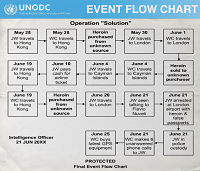
12.6 Event Flow Chart
This self-paced module covers flowchart symbols and their usages and what consists of event rule groups and steps.
Available in: Khmer, Thai
Duration: 60 - 90 min.
13. Human Trafficking
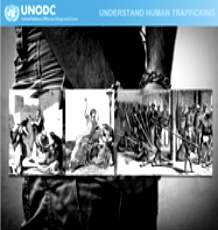
13.1 Understand Human Trafficking
In this self-paced module, you will be introduced to human trafficking and the problems that law enforcement faces in dealing with this serious crime.
Available in: English, Sinhala, Thai, Vietnamese
Duration: 60 min.
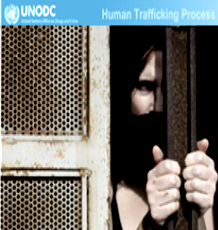
13.2 Human Trafficking Process
This self-paced module covers the detection, investigation and prosecution of offenders. You will learn about the process of human trafficking, how it works, and the different actions involved.
Available in: English, Sinhala, Thai
Duration: 60 min.
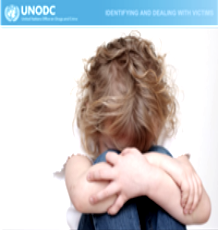
13.3 Identifying and Dealing with Victims
This self-paced module covers the identification of- and dealing with- victims. You will learn better identify and deal with victims of human trafficking.
Available in: English, Sinhala, Thai
Duration: 60 min.
14. Smuggling of Migrants
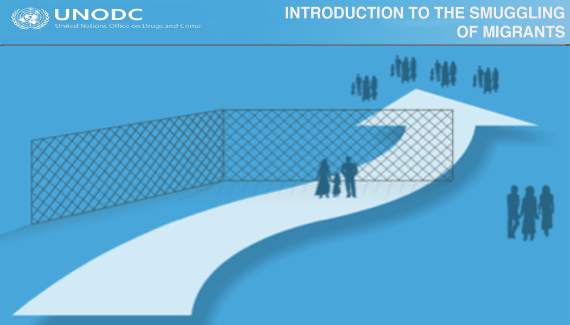
14.1 Introduction to Smuggling of Migrants
This self-paced module covers the legal definition of the smuggling of migrants and the Smuggling of Migrants Protocol. It explains the differences between smuggling of migrants and trafficking in persons and the main actors, categories and modus operandi of those engaged in smuggling of migrants.
Available in: English, Bahasa, Burmese, Chinese, Khmer, Lao, Macedonian, Serbian, Sinhala, Thai, Urdu, Vietnamese
Duration: 60 min.

14.2 Investigative Approaches to Smuggling of Migrants
This self-paced module covers the primary investigative approaches specific to the smuggling of migrants. It details why it is important to treat the smuggled migrant as the victim of a crime and to respond accordingly in the debrief phase to obtain essential evidence.
Available in: English, Bahasa, Burmese, Chinese, Khmer, Lao, Macedonian, Serbian, Sinhala, Thai, Urdu, Vietnamese
Duration: 60 min.
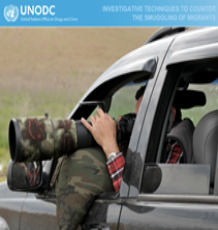
14.3 Investigative Techniques to Counter the Smuggling of Migrants
This self-paced module covers the use of specific investigative techniques. It includes the use of informants, undercover officers, covert and technical surveillance, financial investigation and the use of international cooperation.
Available in: English, Bahasa, Burmese, Chinese, Khmer, Lao, Macedonian, Serbian, Sinhala, Thai, Urdu, Vietnamese
Duration: 60 min.
15. Human Rights
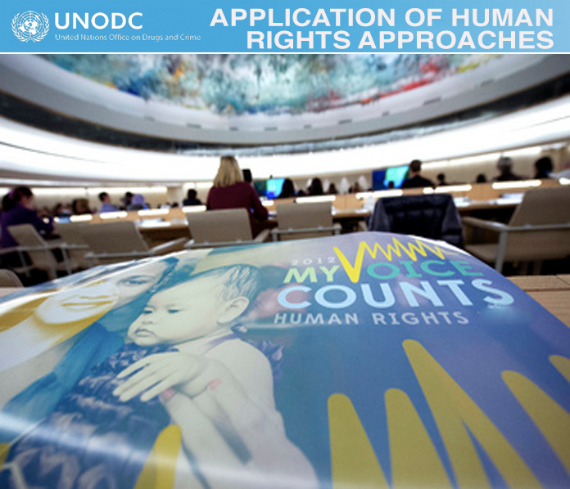
15.1 Application of Human Rights by Law Enforcement Officers
This self-paced module outlines the basic principles and concepts of human rights protection. It considers the importance of human rights in the context of conducting law enforcement duties and the consequences of their violation. It explores fundamental human rights of key relevance to law enforcement, how to apply a human-rights based approach and introduces the role of other criminal justice practitioners and other bodies in respecting, protecting and fulfilling human rights.
Available in: English, French, Sinhala, Thai
Duration: 60 min.
15.2 Human Rights in the Community
This self-paced module provides information on human rights through the eyes of a community member. It explores the basic principles and human rights important to a member of the community, in particular human rights that are significant during times of emergency or conflict, and how human rights are established under specific covenants or treaties. It considers what protection human rights should provide for individuals facing the criminal justice system, for victims of crime, and also how victims should expect to be treated by law enforcement officers.
Available in: English, Sinhala, Thai
Duration: 60 min.
15.3 Preventing Conflict Using a Human Rights-Based Approach
This self-paced module provides training on a human rights-based approach and how this approach can assist to prevent, transform or resolve conflict. It looks at how law enforcement officers should act in accordance with a human rights-based approach and the keys actions for applying this approach in the criminal justice sector during times of emergency or conflict.
Available in: English, Sinhala, Thai
Duration: 60 min.
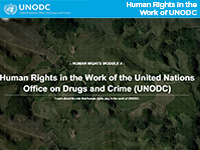
15.4 Human Rights in the Work of UNODC
This self-paced module encourages the learners to think about what human rights are and how they are at the core of the United Nations mandate. Learners will also learn about the legal protections provided by human rights.
Available in: English
Duration: 65 min.
16. Security Document Examination
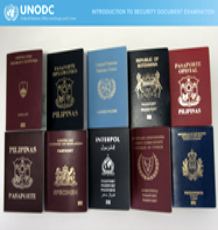
16.1 Introduction to Security and Travel Documents
This self-paced module provides an introduction to security and travel documents and their examination. It includes an overview of the fundamental techniques for analysing security documents including an overview of basic equipment required for document examination. It provides an overview of the screening and examination process for identity documents.
Available in: English, Sinhala, Spanish, Vietnamese
Duration: 60 min.
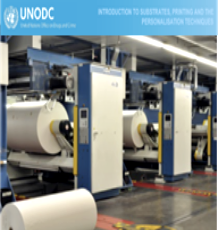
16.2 Introduction to Substrates, Printing and Personalisation Process
This self-paced module provides background information on substrates used for security and travel documents and how it will affect the appearance in particular printing techniques. It includes an overview of the fundamental printing techniques for security documents: offset letterpress, intaglio and silkscreen and details the personalisation techniques of identity/travel documents such as inkjet, thermal mass transfer, thermal dye sublimation and laser engraving.
Available in: English, Sinhala, Spanish
Duration: 60 min.
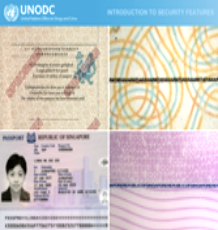
16.3 Introduction to Security Features
This self-paced module covers everything you need to know about substrates, printing and personalisation techniques in the production of security documents. It looks at new physical, printed, and digital security features in detail and reviews examples of genuine security documents to see common security features.
Available in: English, Sinhala, Spanish
Duration: 60 min.
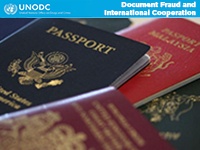
16.4 Document Fraud and International Cooperation
This self-paced module looks at the different types of document fraud that are perpetrated particularly with regard to security documents. It covers the important role of international cooperation in fighting against document fraud and how increased information sharing and the rapid dissemination of intelligence can better counter this crime.
Available in: English, Spanish
Duration: 60 min.
17. Wildlife and Forest Crime
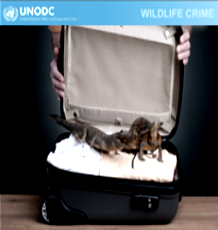
17.1 Wildlife Crime
This self-paced module covers why smugglers conceal wildlife and what type of concealment methods they use. It provides advice on how to increase the possibility of detecting concealed wildlife and thereafter explores the possibilities and standard operating procedures associated with controlled delivery operations.
Available in: English, Burmese, Khmer, Lao, Sinhala, Thai, Vietnamese
Duration: 60 min.
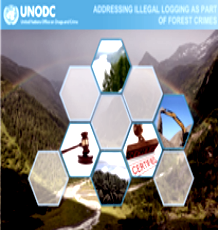
17.2 Illegal Logging
This self-paced module covers illegal logging and the specific investigative techniques required to counter this crime. It explores the strong linkages between illegal logging and corrupt practices.
Available in: English, Bahasa, Lao, Sinhala, Thai, Vietnamese
Duration: 60 min.
18. Risk Management
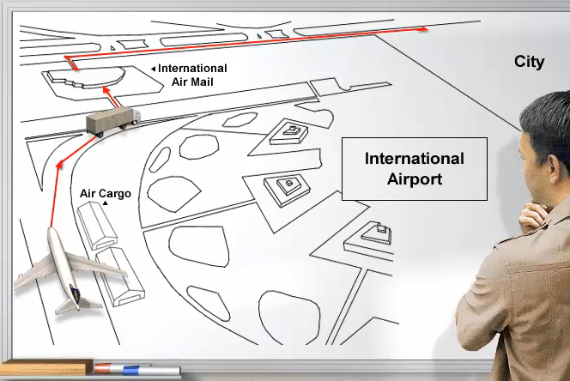
18.1 Introduction to Risk Management
This self-paced module offers an overview of the fundamental pillars of a risk management strategy. An analysis of the necessary steps for risk identification, resources and patterns will provide an introduction to more topics on risk management.
Available in: English, Khmer, Thai
Duration: 90 - 120 min.

18.2 Risk Management at Land Controls
This self-paced module aims to provide relevant agencies with the required background for setting up an effective strategy to perform border controls. Based on risk identification and solutions to overcome system deficiencies currently in place, this module is designed to strengthen law enforcement measures against cross-border criminal activities.
Available in: English, Khmer, Thai
Duration: 60 - 90 min.

18.3 Risk Management at Airports
This self-paced module aims to provide law enforcement agencies with the required background for categorising risks and for improving the detection of criminal activities taking place at airports.
Available in: English, Khmer, Thai
Duration: 70 - 100 min.

18.4 Risk Management at Seaports
This self-paced module aims to provide law enforcement agencies with the required background for categorising risks and to improve the detection of criminal activities in seaports and maritime vessels.
Available in: English, Khmer, Thai
Duration: 50 - 90 min.
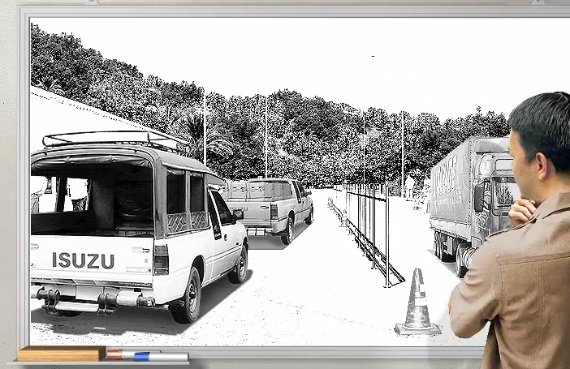
18.5 Conclusion to Risk Management
This self-paced module covers key elements for taking corrective action to prevent or minimise the consequences of risks.
Available in: English, Khmer, Thai
Duration: 45 - 60 min.
19. Cybercrime

19.1 Digital Forensics - Cybercrime
This self-paced module provides a general introduction into the field of digital forensics and forms the basis of subsequent training in cybercrime investigations and digital forensics using UNODC basic and advanced training materials. Due to the widespread use of electronic devices, digital forensics has become a discipline of high importance in law enforcement. You will learn the main concepts of digital forensics and electronic evidence and the relevant steps that need to be taken during the seizure and acquisition procedures.
Available in: English
Duration: 60 - 90 min.
20. HIV/AIDS
20.1 UN Cares - HIV in the Workplace
This self-paced module provides information on reducing the impact of HIV on the United Nations workplace by supporting universal access to a comprehensive range of benefits for all United Nations personnel and their families. These benefits, known as the "UN Cares 10 Minimum Standards", include information and education, voluntary counselling and testing, access to male and female condoms, and emergency prevention measures in case of accidental exposure, amongst other topics. The UN Cares 10 Minimum Standards also call for increased measures to stop stigma and discrimination.
Available in: English, Arabic, French, Spanish
Duration: 60 - 90 min.
21. Anti-Corruption
21.1 Introduction to Anti-Corruption
This self-paced module provides an introduction to the United Nations Convention Against Corruption, what corruption is, the consequences it can have as well as the requirements for how corruption should be addressed.
Available in: English, Arabic, Spanish
Duration: 60 - 90 min.
21.2 Advanced Anti-Corruption: Prevention of Corruption
This self-paced module provides an understanding of the United Nations Convention Against Corruption and explores how, as the only global, comprehensive and legally binding anti-corruption instrument, it can act as a framework for the fight against corruption across the globe. The module covers five main areas: preventive measures, criminalisation and law enforcement, international cooperation, asset recovery and technical assistance and information exchange.
Available in: English, Arabic, Spanish
Duration: 60 - 90 min.
22. Drug Identification and Testing
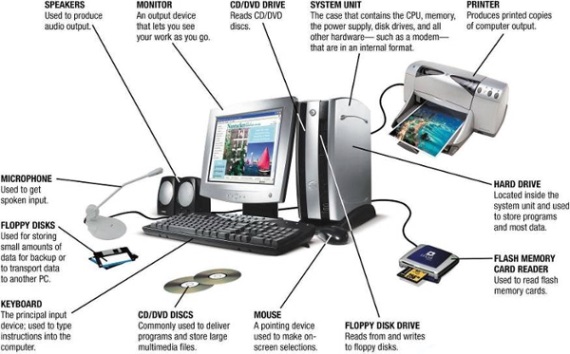
22.1 Basic Computer Instruction
Available in: Khmer
Duration: 60-90 min.
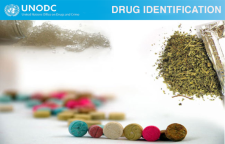
22.2 Drug Identification
Available in: Khmer
Duration: 60-90 min.
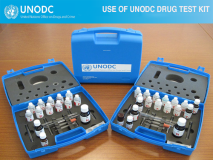
22.3 Drug Testing
Available in: Khmer
Duration: 60-90 min.
23. Gender Issues
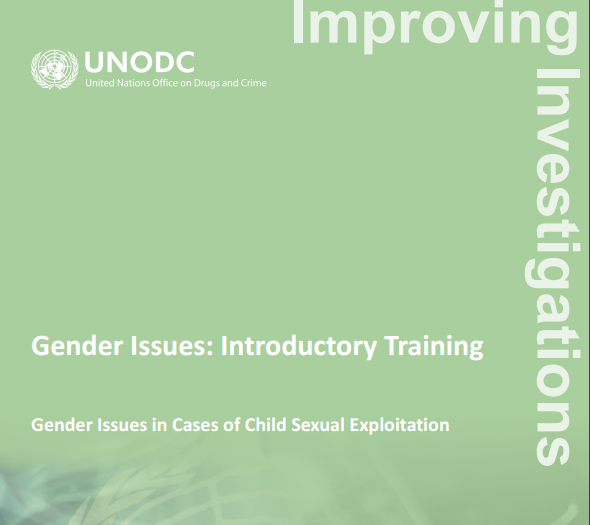
23.1 Gender Issues in Cases of Child Sexual Exploitation
This self-paced module covers gender issues in cases of child sexual exploitation. It develops the ability of law enforcement officials to understand the role of the police in the protection and prevention of child sexual exploitation in tourism and travel and the gender issues surrounding child sexual exploitation.
Please note that this module does not contain a post-test and therefore no certificate is issued.
Available in: English
Available in pdf format.
23.2 Alternatives to Imprisonment for Women Offenders
This self-paced module addresses gender-based discrimination in the criminal justice system and explains non-custodial measures that should be made available to women offenders in line with international standards and norms. This course was developed by UNODC and the Council of Europe for criminal justice practitioners.
Please note that this module does not contain a post-test and therefore no certificate is issued.
Available in: English
Available in pdf format.
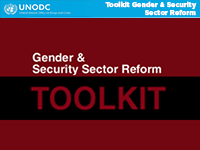
23.3 Toolkit: Gender & Security Sector Reform
This toolkit presents best practices and recommendations for strengthening a gender perspective within the security sector. It aims to integrate a gender perspective into the work of the actors and institutions that comprise the security sector and its supporting structures. The Gender and Security Sector Reform Toolkit is an initial response to the need for more information and analysis on gender and security sector reform processes. It was prepared by the Geneva Centre for the Democratic Control of Armed Forces (DCAF) and the UN Women Training Centre (former INSTRAW), and the OSCE Office for Democratic Institutions and Human Rights (ODIHR).
Please note that this toolkit does not contain a post-test and therefore no certificate is issued.
Available in: English, Arabic, Bahasa, French, Spanish
Available in pdf format.
24. Investigating Sexual Exploitation of Children
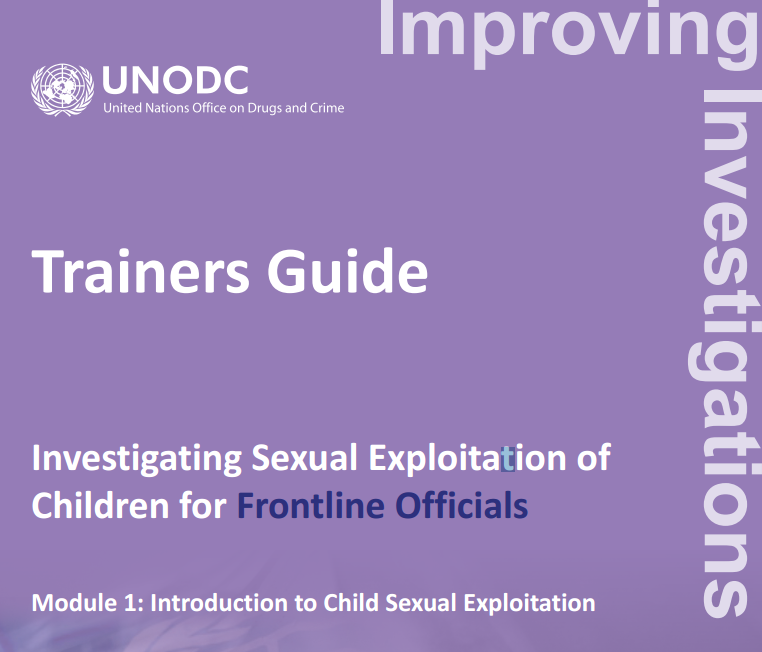
24.1 Introduction to Investigation of Child Sexual Exploitation
This self-paced module aims to develop the ability of frontline law enforcement officials. You will learn about the phenomenon of sexual exploitation of children and the laws relating to it.
Please note that this module does not contain a post-test and therefore no certificate is issued.
Available in: English
Available in: pdf format

24.2 Victims in Child Sexual Exploitation Cases
This self-paced module aims to develop the ability of frontline officials to identify and interview victims. You will learn interview skills specific to child victims of sexual exploitation.
Please note that this module does not contain a post-test and therefore no certificate is issued.
Available in: English
Available in: pdf format

24.3 Evidence in Child Sexual Exploitation Cases
This self-paced module aims to enhance the skills of frontline law enforcement officials in crime scene preservation and evidence collection. You will learn how to collect evidence in child sexual exploitation cases.
Please note that this module does not contain a post-test and therefore no certificate is issued.
Available in: English
Available in: pdf format

24.4 First Responder Duties in Child Sexual Exploitation Cases
This self-paced module aims to develop an understanding of the duties of a frontline official and their practical skills as first responders to a case involving child sexual exploitation.
Please note that this module does not contain a post-test and therefore no certificate is issued.
Available in: English
Available in: pdf format
25. Investigating Sexual Exploitation of Children for Specialist Investigators
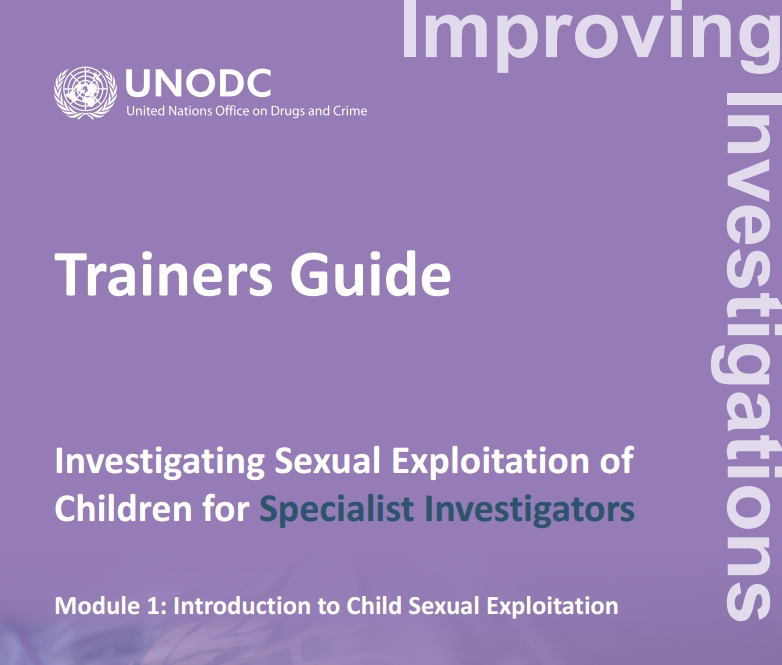
25.1 Introduction to Investigation of Child Sexual Exploitation
This self-paced module aims to develop the ability of specialist law enforcement officials to understand sexual exploitation of children and the relevant international and domestic legal context. Please note that this module does not contain a post-test and therefore no certificate is issued.
Available in: English
Available in: pdf format

25.2 Victims in Child Sexual Exploitation Cases
This self-paced module aims to develop the ability of specialist investigators to identify victims and build up interview skills to interview child victims as witnesses in accordance with legal requirements and accepted best practices. Please note that this module does not contain a post-test and therefore no certificate is issued.
Available in: English
Available in: pdf format

25.3 Child Sex Offenders
This self-paced module aims to provide specialist investigators with the knowledge and skills to identify travelling child sex offenders. You will learn to recognise their modus operandi and to conduct interviews of suspects. Please note that this module does not contain a post-test and therefore no certificate is issued.
Available in: English
Available in: pdf format

25.4 Evidence in Child Sexual Exploitation Cases
This self-paced module aims to enhance the skills of specialist investigators to conduct search and seizure operations and to collect evidence in child sexual exploitation cases in compliance with relevant legal standards. Please note that this module does not contain a post-test and therefore no certificate is issued.
Available in: English
Available in: pdf format

25.5 Investigating Child Sexual Exploitation Cases
This self-paced module aims to ensure that investigators are able to understand investigation techniques, risk assessment analysis, and procedures for managing cases of child sexual exploitation. Please note that this module does not contain a post-test and therefore no certificate is issued
Available in: English
Available in: pdf format

25.6 Cooperation in Child Sexual Exploitation Cases
This self-paced module covers the necessary knowledge and skills needed to cooperate with domestic and international agencies in child exploitation investigations. Please note that this module does not contain a post-test and therefore no certificate is issued
Available in: English
Available in: pdf format
26. International Narcotics Control Board
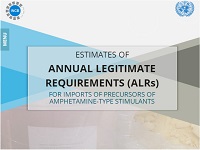
26.1 Estimates of Annual Legitimate Requirements (ALRs) for Imports of Precursors of Amphetamine-Type Stimulants
Coming soon
Available in: English
Duration: 25 min.
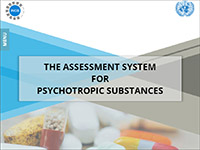
26.2 Assessment System for Psychotropic Substances
Coming soon
Available in: English
Duration: 35 min.
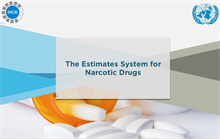
26.3 Estimates for Narcotic Drugs for Medical and Scientific Purposes
Coming soon
Available in: English
Duration: 80 min.
27. Safe Handling and Disposal of Chemicals in Remote, Developing and Non-Secure Environments
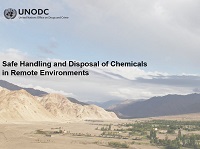
27.1 Initial Assessment and Safety Procedures
This module will teach you some first steps which should be taken when dealing with a chemical seizure in a remote environment and the essential personal protective equipment required when handing or disposing of chemicals to keep you safe and prevent injury. The module will also teach you the critical safety principles which should be followed when handling, transporting or storing any chemicals in remote environments.
Please note that this module does not contain a post-test and therefore no certificate is issued.
Available in: English
Duration: 60 min.

27.2 Identification of Chemicals, Safe Disposal Locations and Application of the Illustrated Disposal Guide for the Disposal of Chemicals Used in the Illicit Manufacture of Drugs
This self-paced module covers Chapters 4 to 6 of the UNODC manual entitled
Illustrated disposal guide for the disposal of chemicals used in the illicit manufacture of drugs. It covers the basic identification and hazard class information on common chemical labels as well as discusses identification of safe disposal locations and the practical use of the guide.
Please note that this module does not contain a post-test and therefore no certificate is issued.
Available in: English
Duration: 60 min.

27.3 Rapid Disposal Procedures
This self-paced module covers Chapters 7 to 13 of the UNODC manual entitled
Illustrated Disposal Guide for the Disposal of Chemicals Used in the Illicit Manufacture of Drugs. It looks at rapid disposal procedures including open-air burning for use in environments where there is an immediate or time critical need for disposal or destruction of chemicals.
Please note that this module does not contain a post-test and therefore no certificate is issued.
Available in: English
Duration: 60 min.

27.4 Chemical and Engineered Disposal Procedures
This self-paced module covers Chapters 14 to 19 of the UNODC manual entitled
Illustrated Disposal Guide for the Disposal of Chemicals Used in the Illicit Manufacture of Drugs. It looks at several passive and environmentally sustainable disposal procedures as well as engineered disposal procedures including encapsulation and rendering inert procedures for controlled substances. This module is the final module in this series.
Available in: English
Duration: 60 min.
28. Strengthening National Evaluation Capacity

28.1 Introduction To Evaluation: Strengthening National Evaluation Capacity for achieving the Sustainable Development Goals
This self-paced module focuses on key evaluation concepts and on why strengthening national evaluation capacity matters for achieving the Sustainable Development Goals.
Available in: English
Duration: 60 min.

28.2 Evaluating Policies and Programmes
This self-paced module focuses on building management and technical skills for evaluating policies and programmes.
Available in: English
Duration: 60 min.
29. Firearms Trafficking
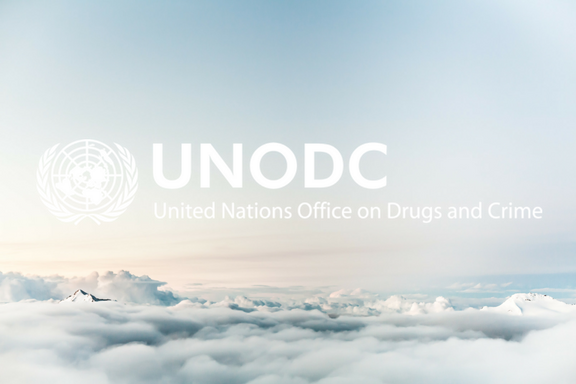
29.1 United Nations Convention against Transnational Organized Crime and its Protocols
Coming soon
Available in: English, French

29.2 Dimensions of the Firearms Problem
Coming soon
Available in: English, French

29.3 Identification, Marking and Record Keeping of Firearms
Coming soon
Available in: English, French

29.4 International Legal Regime on Firearms
Coming soon
Available in: English, French

29.5 Criminal Offences involving Firearms, and Firearms as Evidence
Coming soon
Available in: English, French

29.6 Special Investigative Techniques
Coming soon
Available in: English, French

29.7 International Cooperation in Criminal Matters
Coming soon
Available in: English, French

29.8 Transfer Controls, Brokering and Links for Border Control
Coming soon
Available in: English, French
30. HIV Service Provision for People Who Inject Drugs

30.1 HIV Service Provision for People Who Inject Drugs (Part 1)
Coming soon
Available in: English, Russian
Duration: 40 min.

30.2 HIV Service Provision for People Who Inject Drugs (Part 2)
Coming soon
Available in: English, Russian
Duration: 40 min.

30.3 HIV Service Provision for People Who Inject Drugs (Part 3)
Coming soon
Available in: English, Russian
Duration: 40 min.
31. Organized Crime

31.1 Organized Crime
Coming soon
Available in: English
Duration: 50 min.
32. Judicial Ethics

32.1 Judicial Conduct and Ethics: Global eLearning for Judges in the 21st Century - Independence
This self-paced module is an introduction to the origins, purpose and content of the Bangalore Principles of Judicial Conduct. It covers the first Principle of Independence and explains its relevance and application to a judge's work and life. It also describes the interaction between social media and judicial conduct.
Please note that this module does not contain a post-test and therefore no certificate is issued.
Available in: English
Duration: 80 min.

32.2 Judicial Conduct and Ethics: Global eLearning for Judges in the 21st Century - Impartiality and Integrity
This self-paced module covers the second and third Bangalore Principles of Impartiality and Integrity. It describes the most common biases which judges should be aware of and explains how impartiality and integrity issues may come into play both within and outside of a judge's workplace.
Please note that this module does not contain a post-test and therefore no certificate is issued.
Available in: English
Duration: 80 min.

32.3 Judicial Conduct and Ethics: Global eLearning for Judges in the 21st Century - Propriety, Equality and Competence and Diligence
This self-paced module looks at the fourth, fifth and sixth Bangalore Principles of Propriety, Equality and Competence and Diligence. It explains how these Principles apply to a judge's work and life and describes a range of methods to help a judge deal with associated challenges. It also introduces various gender-related topics that may raise potential breaches of the Bangalore Principles. This module is the final module in this series.
Coming soon
Available in: English
Duration: 80 min.
33. Counter-Terrorism

33.1 The International Legal Framework Against CBRN Terrorism
Coming soon
Available in: English, French, Spanish
